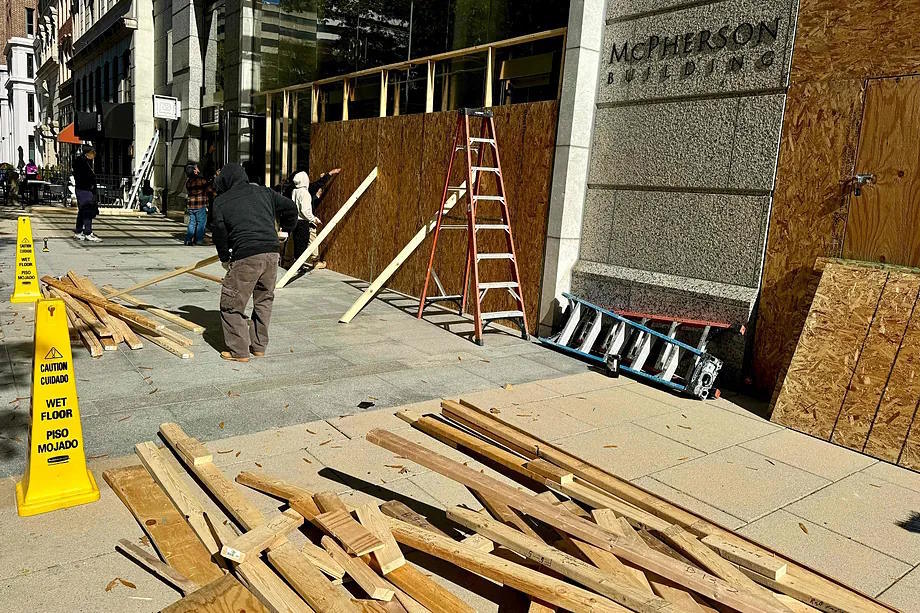On Monday morning, Washington DC Mayor Muriel Bowser convened her Interfaith Council for a unique community meeting titled: 'Our city in prayer: united in faith and hope.' The official goal was to bring together residents and leaders of various faiths at Shiloh Baptist Church to demonstrate "solidarity, resilience, and hope for the community." Unofficially, to reassure ahead of the next 11 weeks, which many in the District of Columbia fear may be marked by tension and even violence, as it was four years ago.
The fact that the city has started raising barricades, walls, and fortifying federal buildings in recent days does not help to ease tensions. It's not just around the White House, with bollards, concrete blocks, and fences minimizing pedestrian traffic. Panels have been erected to cover all kinds of federal buildings and nearby office complexes. The Department of the Treasury, Lafayette Square, as well as the outer perimeter of the Naval Observatory, the official residence of Vice President Kamala Harris.
The same goes for the Capitol, which has never fully returned to normalcy since four years ago. There are temporary barriers for pedestrians and cyclists, and police signs everywhere, even though there are no congressmen or senators now, as they are fighting for their seats this Tuesday in the 50 states. Even some of the major monuments on the Mall show additional security measures.
The second unusual security block is the one that has been set up surrounding Howard University, Harris's alma mater, where her campaign will gather on election night. The same style of security perimeter as at the NATO summit in July, with closed streets, diverted traffic, and construction bans over several kilometers. "The truth is that I feel very sad about the current situation," said the capital's mayor yesterday in statements reported by local media. "But the way I deal with anxiety is by working and making sure we are as prepared as possible."
The residents of the capital are as nervous and anxious as she is. Polls show that the elections are tied, more than ever, raising concerns about complicated recounts, litigations as in previous occasions. And one of the candidates, Donald Trump, who has never acknowledged his loss in 2020, is preparing the ground for a fierce battle, although it is not clear on what terms: "Honestly, I shouldn't have left," he said last weekend about his departure from the White House.
Uncertainty will be the prevailing scenario until January 20, when the next president is supposed to be inaugurated. That's why authorities, who have come together after the Capitol assault on January 6, 2021, do not want any surprises. They have strengthened ties with federal agencies, the Capitol Police have increased their staff, and 3,300 DC police officers will work 12-hour shifts, without vacations, in the coming weeks. "We will not tolerate violence in our city, nor destruction or any illegal behavior... We will not tolerate property destruction and we will not tolerate threats to public safety or to this electoral process," promised the city's police chief, Pamela A. Smith, at a press conference this Monday. "We want everyone to know that we are prepared to handle many different scenarios and that we have the right people to keep our city safe," she added.
On Tuesday, the police will focus on polling stations, the White House, and downtown, mobilizing helicopters and drones. They do not rule out the presence of additional snipers near areas where long lines are expected, as in other sensitive counties in the country, due to the proliferation of threats and harassment of electoral officials since 2020.
No disturbances of any kind are expected, at least in the short term. But the lesson from January 2021 still stings. Washington is the capital, but the real pressure won't be here, at least not until December. The next two or three weeks are crucial at the state level, as it is the counties and governors who have to certify the results. Only when that phase is completed does the ball pass to Congress.
Nevertheless, a walk around the vicinity of the White House shows fences, gates, and wood protecting windows up to the first floor of some buildings. There are no longer glass windows or facades on some blocks, not even in stores, restaurants, or bars, a clear deterrent for customers. But they prefer to err on the side of caution. The example of 2021 serves as a template, and although they don't really believe it will be the same, or worse, property owners say that no one saw the Capitol takeover coming either. So, nothing is off the table.
Social media has been filled these days with photos and videos of riot barriers, walls over a meter thick on McDonald's windows, and even panels up to five meters high in classic establishments like Potbelly.
"The Secret Service is working closely with federal, state, and local partners in Washington, DC, and Palm Beach County, Florida, to ensure high levels of security on election day," a Secret Service spokesperson told Newsweek. "These enhancements are not in response to any specific issue but are part of a broad public safety preparedness for Tuesday's elections." The Palm Beach County Convention Center, a short distance from Mar-a-Lago, is where Trump and his team will await the count on the night of November 5 to 6.
"We recognize the importance of upholding people's rights under the First Amendment to peacefully express their views, and we are committed to facilitating lawful demonstrations while maintaining public order. While there have been no indications of large-scale protests, events, demonstrations, or violent activities, the Washington Police Department urges the public to remain vigilant," the department said this week in a statement.
